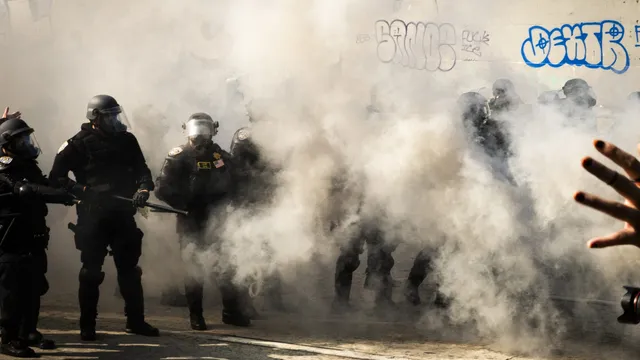
Cudahy vice mayor urges gang members to protect territory from ICE
2025-06-26 21:56- Cynthia Gonzalez, Vice Mayor of Cudahy, posted a video urging local gangs to resist ICE raids.
- Her comments sparked a federal investigation and backlash from law enforcement agencies.
- The incident highlights the contentious nature of immigration enforcement and local political responses.
Express your sentiment!
Insights
In recent days, Cynthia Gonzalez, the Vice Mayor of Cudahy in California, has come under scrutiny after a social media video surfaced. In this video, she seemingly urged members of local gangs, specifically the 18th Street and Florencia 13, to organize and defend their neighborhoods against U.S. Immigration and Customs Enforcement (ICE) raids. This video was posted against the backdrop of increased immigration enforcement operations in Los Angeles, sparking protests and community response. Gonzalez criticized the gangs for their silence during these critical times and claimed that they should stand up in defense of their turf against what she referred to as the 'biggest gang.' The video quickly garnered significant backlash, leading to allegations of inciting violence against federal law enforcement. After posting the video, which was soon deleted, Gonzalez reportedly faced an FBI investigation for potentially calling for gang violence. The Department of Homeland Security condemned her comments, indicating that they could heighten risks for ICE personnel and further escalate tensions during immigration enforcement actions. Cudahy's city officials later distanced themselves from her remarks, stating that they do not represent the city's official position. Gonzalez has also publicly acknowledged the potential legal ramifications and has sought legal advice as a result of the fallout from her statements. The local and federal responses highlight the broader issues surrounding immigration policies and community safety, particularly regarding how local leaders communicate with and engage marginalized communities and groups. Critics of Gonzalez’s statements perceive them as reckless and dangerous, further complicating the already contentious relationship between immigrant communities and federal law enforcement. This incident encapsulates the growing divide in opinions over how cities should approach immigration enforcement and the role of leaders in influencing public sentiment. Local authorities, including police, express concern that Gonzalez's remarks may encourage confrontations between gang members and federal agents, leading to an uptick in violence. As protests against ICE raids have emerged across various neighborhoods in Los Angeles, Gonzalez’s remarks could be viewed as a rallying point or a spark for further unrest. The chilling effect of her comments raises questions about accountability and the responsibilities of elected officials in a climate where immigration policies are increasingly zealous. With community sentiments deeply split and tensions escalating, the need for dialogue about safety, law enforcement, and community rights remains crucial in Cudahy and beyond.
Contexts
The impact of Immigration and Customs Enforcement (ICE) raids on local communities in Los Angeles has become a critical issue, particularly given the demographic makeup of the region. As a major urban center, Los Angeles is home to a substantial population of immigrants, many of whom are in vulnerable situations and reside in fear of deportation. Reports have consistently indicated that ICE raids create an environment of anxiety and stress among immigrant communities, leading to a pervasive climate of fear. This fear affects not only the targeted individuals but also their families and the broader community, creating significant social challenges. The psychological strain can lead to increased mental health issues, disrupt community cohesion, and hinder access to essential services such as healthcare and education, which are vital for the overall wellbeing of residents. Another significant consequence of ICE raids is the disruption of local economies. Many immigrants play crucial roles in the workforce, particularly in industries such as agriculture, construction, and service sectors. The sudden removal of individuals due to ICE operations can create labor shortages, leading to economic instability for local businesses that rely on immigrant labor. Additionally, the fear of deportation can result in decreased consumer spending as families cut back on expenses due to uncertainties about their economic security. Small businesses, which often serve immigrant communities and rely on their patronage, may suffer significant losses, further exacerbating economic challenges in the area. Furthermore, ICE raids have broad implications for community policing and trust in law enforcement. Many residents feel alienated and distrustful of police, believing that cooperation with law enforcement could lead to deportation. This distrust undermines public safety, as individuals may be less likely to report crimes or seek assistance in dangerous situations. The relationship between immigrant communities and law enforcement becomes fraught with tension, which can hinder community engagement efforts and impede crime prevention strategies. As communities struggle to navigate the complexities introduced by these raids, the potential for increased criminal activity may rise if residents feel they cannot rely on local law enforcement. In conclusion, the ramifications of ICE raids on Los Angeles neighborhoods transcend immediate enforcement actions and reveal critical social, economic, and public safety issues. The ongoing impact manifests through fear, economic instability, and eroded trust in community institutions. It is essential for policymakers to understand these effects comprehensively to develop humane and effective immigration policies that protect vulnerable populations while addressing legitimate public safety concerns. By fostering trust and creating pathways for open communication between immigrant communities and local authorities, Los Angeles can work towards building a more inclusive society where all residents feel safe and valued.